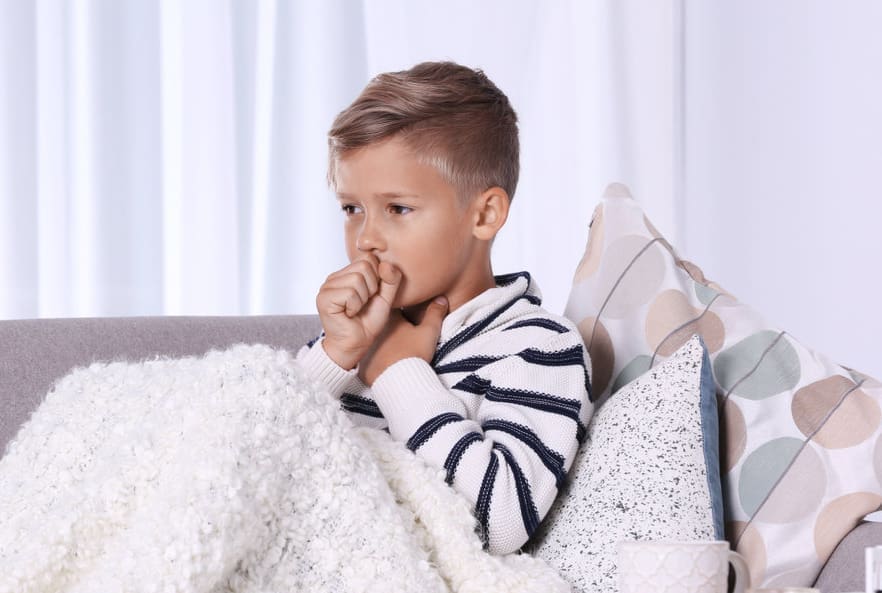What are must-have items for parents during cold and flu season?
Make sure you have these cold and flu essentials at home to monitor your child’s health and help provide relief:
1. A working thermometer
A fever is a sign that your child’s immune system is fighting off an infection. If your child feels warm, or is sweating, shivering or acting irritable, check their temperature using a thermometer. There are different types of thermometers for children, and it’s important to have one that you’re comfortable using and is appropriate for your child’s age. Dr. Lee recommends infrared thermometers for forehead readings or traditional digital thermometers for oral or rectal use. Learn more tips for checking and treating fever in kids.
2. Saline spray and nasal bulb syringe or aspirator
A saline solution, such as a nose spray or mist, can help loosen thick mucus in a congested nose. If your child is too young to blow their nose effectively, use a suction bulb or a nasal aspirator to help clear nasal passages. Suctioning can be especially helpful before bed and after waking up, and for babies, before feeding.
Extra tip for congestion relief in kids: Breathing in water vapors from a warm bath or shower can also help loosen mucus.
3. Fever-reducing medications
It can be helpful to have children’s acetaminophen (Tylenol) or children’s ibuprofen (Motrin) in the house in case your child spikes a fever. While these medications won’t treat the root cause of your child’s fever, they can help provide quick relief. A few reminders for parents:
- Check the expiration date on fever medications before using.
- Check the label or call your pediatrician to check the correct dose for your child’s age and weight.
- For fever in babies under 3 months old, always call your pediatrician first.
- Do not give ibuprofen to babies under 6 months old.
- Do not give aspirin to children under the age of 18. It can have dangerous side effects in children.
4. Sore throat remedies
Some of the best ways to soothe a sore throat are better kept in the kitchen rather than a medicine cabinet. Warm liquids, such as hot water with lemon, broth or caffeine-free tea for older children, can help reduce soreness and loosen mucus. Honey can also calm a sore throat and reduce coughing in children over the age of 1. Icy treats like popsicles are another way to relieve a sore throat – and might be a favorite remedy for kids.
5. Hand soap and cleaning products
Proper hand hygiene is one of the best ways to prevent your child from catching a winter illness in the first place. Make sure you have antibacterial hand soap readily available around the house, and stock up on hand sanitizer for on-the-go situations – such as in the car or clipped to kids’ backpacks for school. Clean frequently touched objects with disinfectant wipes or sprays to reduce the risk of spreading germs.
Other helpful remedies for cough and congestion in kids
Having the following items on hand can also help ease your child’s cold or flu symptoms, including congestion, sore throat and cough.
- Cool-mist humidifier – Dry air can make a child’s cough and congestion worse. Consider placing a cool-mist humidifier in your child’s room, near where they sleep.
- Topical vapor rub – This remedy may help reduce nighttime cough when applied to the chest. Dr. Lee advises using vapor rub only for children 2 years and older.
- Afrin nasal spray – For the treatment of severe congestion, use Afrin nasal spray nightly for no more than 2-3 days for children 6 years and up.
Which cold and flu products should you avoid with kids?
Parents should avoid giving young children over-the-counter cough and cold medicines. Children under 6 should not be given any over-the-counter cough or cold medications.
“Cold medicines attempt to treat the symptoms of a cold,” says Dr. Lee. “Unfortunately, these medications are not effective cold treatments and should not be given to children under the age of 6 years, as they could also cause side effects.”
Potential side effects of over-the-counter cold and cough medicines in children include increased heart rate, excessive drowsiness, convulsions and nausea.
Because over-the-counter cold and cough medicines are not recommended for young children, parents might be tempted to try one of the many natural or holistic cold and flu remedies available for children, such as elderberry supplements. However, Dr. Lee warns that these products are not FDA-regulated, and their safety and effectiveness are not always clear. Rather than purchase these products, it’s better to stick with tried-and-true home remedies.
What other steps can my family take to stay healthy during cold and flu season?
Being diligent about hand washing and household disinfecting can go a long way in reducing the likelihood that a cold or flu will spread from one family member to the next. Getting enough rest and eating a healthy diet can also help keep immune systems strong. Most importantly, make sure every member of your family over 6 months of age gets their annual flu shot to reduce the likelihood of catching the flu altogether. Call your child’s pediatrician to schedule their flu shot, or see more resources to find a flu vaccine location.
In addition to avoiding the common winter illnesses that normally circulate, families also need to take steps to reduce the risk of COVID‑19, such as wearing a face mask when indoors in public in areas with high COVID‑19 spread and practicing social distancing. Eligible people (including children over age 12) should become fully vaccinated against COVID‑19. Flu vaccines and COVID‑19 vaccines can be given at the same time per CDC guidelines. Learn more ways to prevent the spread of COVID‑19, and see additional resources to help keep your family healthy at the Children’s Health COVID‑19 hub.


